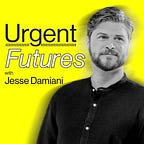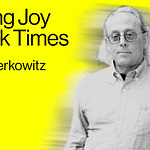Welcome to the Urgent Futures podcast, the show that finds signal in the noise. Each week, I sit down with leading thinkers whose research, concepts, and questions clarify the chaos, from culture to the cosmos.
The best way to support the show, you ask? 🤓 Pop over to YouTube and hit that Subscribe button. You hear it all the time for a reason—nothing will help the channel grow more than that simple click.
My guest this week is Nina Jankowicz.
Nina Jankowicz, the co-founder and CEO of The American Sunlight Project, is an internationally-recognized expert on disinformation and democratization, one of TIME magazine’s 100 Most Influential People in AI, and the author of two books: How to Lose the Information War (2020), which The New Yorker called “a persuasive new book on disinformation as a geopolitical strategy,” and How to Be A Woman Online (2022), an examination of online abuse and disinformation and tips for fighting back, which Publishers Weekly named “essential.” Jankowicz has advised governments, international organizations, and tech companies, and testified before the US Congress, UK Parliament, and European Parliament.
In 2022, Jankowicz was appointed to lead the Disinformation Governance Board, an intra-agency best practices and coordination entity at the Department of Homeland Security; she resigned the position after a sustained disinformation campaign caused the Biden Administration to abandon the project. From 2017-2022, Jankowicz has held fellowships at the Wilson Center, where she led accessible, actionable research about the effects of disinformation on women and freedom of expression around the world. She advised the Ukrainian Foreign Ministry on strategic communications under the auspices of a Fulbright-Clinton Public Policy Fellowship in 2016-17. Early in her career, she managed democracy assistance programs to Russia and Belarus at the National Democratic Institute.
Nina has lived a fascinating life, which is not to say that it’s always been easy. In many ways she has lived out the very things that she’s spent her career researching and working to address.
I first encountered Nina’s work in How to Lose the Information War, which really clarified my understanding of how Russian influence operations work. This was in 2020, when concern about disinformation and its impacts had reached all-time highs, especially with regard to the rise of conspiracy theories like QAnon, antivax communities, and more. How to Lose the Information War was a book that helped me see how these seemingly convoluted outcomes were grounded in basic, repeatable strategies (not just by Russians per se, but by anyone seeking to manipulate the information sphere at scale).
In recognition of her work and scholarship, Nina was tapped to lead the Disinformation Governance Board at the Department of Homeland Security in 2022. But her tenure was short-lived—in no small part because of the very influence operations and toxified media environment that she had been working to illuminate and address. We talk about this more in-depth in the episode.
Already in 2022 talk of disinformation and misinformation didn’t have the fangs that it had during the Trump years. In some ways that speaks to half of the American populace feeling like they could ramp down from the state of hypervigilance they’d maintained during the preceding years. But just because it wasn’t as hot of a topic of conversation anymore didn’t mean that bad actors weren’t still endeavoring to interfere with the information environment. If anything, the lack of a magnifying glass probably made for ideal conditions to build out new operations and social communities.
Which is why Nina’s latest effort, The American Sunlight Project feels like such an important organization at this moment. Yes, there are complicated questions about what means we use to determine if something is true, but at bare minimum we need an information space predicated on good-faith attempts to reach consensus, even if through debate. To do that, we need to understand the media environment we’re in and the strategies we need to develop to preserve our ability to communicate. And Nina is one of the key figures leading us in that direction.
If you’re loving the Urgent Futures podcast…
Please subscribe + leave a review on your preferred podcast platform! Or recommend it to a friend who might like it. All of it help the podcast grow.
Guests on Urgent Futures are experts across art, science, media, technology, AI, philosophy, economics, mathematics, anthropology, journalism, and more. We live in complex times; these are the voices who will help you orient to emerging futures.
🎧 Audio versions of the podcast can be found Apple Podcasts, Spotify, or wherever you listen to podcasts. If you like what you hear, please subscribe!
Support Reality Studies:
NOTE: Thank you for supporting my work by purchasing these products through the links provided. I will only ever share products I actually believe in.
Health & Wellness:
ZBiotics: Right now, get 10% off ZBiotics. Just head over to zbiotics.com and use code JESSEDAMIANI. If you have an evening with drinking and a morning you need to feel fresh, I strongly recommend these.
Genetically engineered by a team of PhD microbiologists, ZBiotics is a probiotic drink that breaks down the byproduct of alcohol responsible for rough mornings after drinking (acetaldehyde).
MUD\WTR: Right now, get 43% off starter packs using this link and the code SUMMER. There’s four different blends to choose from, but my current favorite is :rest. “This is our protest to hustle culture,” they say, and that resonates with me. Not only does it actually help me ramp down to sleep, but since I froth a little milk and make a latte with it, I get the warm cozy feeling of morning coffee at night. (For the evening tea drinkers out there: I’m not saying it’s better, just different!)
Mission Farms CBD: Mission Farms CBD crafts full-spectrum CBD products for specific conditions like sleep, stress, and discomfort, using a combination of CBD and terpenes found in essential oils. I swear by this stuff: I take one of their Marionberry Lemon gummies to end each day.
There’s a lot of junk CBD on the market. All of Mission Farms’s CBD comes from a small farm in Bend, Oregon. They farm the hemp organically, tend every plant by hand, and test for purity four times: the soil, the hemp, the hemp-extract, and the final products. This CBD is designed for wellness and it shows. Go to this link and sign up for emails to get 25% off your first order.
Digital Hygiene:
1Password: Listen, I know from personal experience that password managers don’t make for the most riveting dinner party conversation, but I need to express 3 things: 1) They make your life so much easier—it’s called “1Password” because once you get set up it’s the only password you’ll ever need to remember again. 2) They make your online life so much safer, ensuring that you use unique passwords for every account, stored with a high degree of encryption. 3) They are not nearly as complicated to set up as you think they are! Head over to 1Password using this link for a free trial, and individual plans for less than $3/mo after that.
NordVPN: Right now, get up to 72% off 2-year plans + 3 extra months using this link. Some people tell me that “VPN” brings to mind ideas of hackers and the dark web, but honestly VPNs are just an extremely easy way to stay much safer online. I’ve used NordVPN for the past four years, and appreciate what they offer, including Threat Protection against malware, 24/7 customer support, fast speeds, and more. One account can protect up to 6 devices (phone and computer), and they don’t track or share what you do online. Another benefit: you can always access the content/apps you have at home, wherever in the world you are.
CREDITS: This podcast is edited and produced by Adam Labrie and me, Jesse Damiani. Adam Labrie also directed, shot, and edited the video version of the podcast, which is available on YouTube. The podcast is presented by Reality Studies. If you appreciate the work I’m doing, please subscribe and share it with someone you think would enjoy it.
Find more episodes of Urgent Futures at: youtube.com/@UrgentFutures. Past conversations include Taylor Lorenz, Lia Halloran & Kip Thorne, Cherie Hu, Lisa Messeri, Legacy Russell, and more. Here is another recent episode with economist and educator Michael Mezzatesta:

















